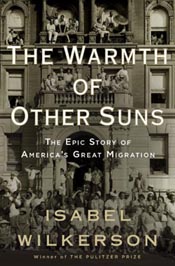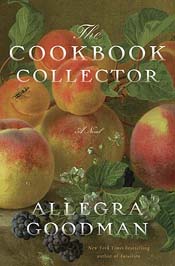As a journalist who loves narrative nonfiction, I always read books written by journalists with questions about the processing of writing the book: How did they verify that detail? How did they pick the narrative? What challenges did they have getting people to share their stories?
So when Isabel Wilkerson, author of the Indie Lit Awards Non-Fiction winning book The Warmth of Other Suns (which is a great book!) agreed to answer some questions, I was thrilled. Isabel graciously sent some amazing answers to my questions from the airport in Celeveland where she was stranded because of a blizzard — we have those often in the Midwest — after being on the road for two weeks talking about the book. I’m really honored she’d take the time to do that, and excited to share her responses with you. Enjoy!
Kim: What was your inspiration for trying to tell the story of the Great Migration?
Isabel: My inspiration for trying to tell the story of the Great Migration came from many places, expected and not so expected. In a way, it came down to connecting the dots from multiple sources of inspiration.
For one, I’m a product of the very phenomenon I chose to write about, and I owe my very existence to it. But that alone would not be sufficient reason because it’s the story of a great many Americans.
Several things happened to spark something inside of me. One was traveling as a national correspondent and bureau chief for The New York Times. It seemed that no matter which northern or western city I happened to be in, if I were interviewing African-Americans, they would invariably make a reference to a specific state in the South that they or their families had come from. The different streams and tributaries of this great movement were visible in most every interaction, and I began to realize that it had been a national outpouring of people over many decades. It made me realize how massive it was.
But probably what contributed most to my decision to devote myself to this book was a series of works on the immigrant experience that I so identified with, that spoke to my own childhood and made me realize that I had, in fact, grown up the daughter of immigrants, so to speak.
I saw myself in the daughters of Amy Tan’s The Joy Luck Club, daughters negotiating two forces — both the expectations of ambitious mothers who had sacrificed everything to come to a foreign land, and the New World that seemed at odds with the values of the Old Country. It occurred to me that, in the elite public schools my mother enrolled me in, I had gravitated to the children of recent immigrants because we had so much in common.
Another inspiration was the Barry Levinson film, Avalon, that described an immigrant family’s adjustment to the New World of Baltimore. When I saw it, I thought to myself that if you changed the names and place of origin, the film could have been about families that I grew up around in Washington, D.C., but who had migrated from Georgia and the Carolinas instead of eastern Europe.
I re-read The Grapes of Wrath with new eyes and realized there had been no The Grapes of Wrath for the Great Migration, and thought there ought to be something that would capture the hopes and dreams and journeys of these people before it was too late. I am not suggesting that this is equivalent to The Grapes of Wrath, but that I had it in the back of my mind as I set out to interview as many people as I could, reluctant though most of them were.
 Kim: How did you decide on the title of the book?
Kim: How did you decide on the title of the book?
Isabel: At one point in the research process, I was reading a book a day — books on citrus production or southern geology or obscure court cases in Florida. I took to paying close attention to the footnotes and actually enjoyed reading them. I was reading the footnotes of the annotated version of Richard Wright’s autobiography, Black Boy, when I saw a passage that had been in the original published version of the book but omitted in the text of the current version.
This passage had not been part of the original manuscript he had submitted, and he had had to write it in haste when he had been asked to cut the second half of the manuscript in order to get it published. Under deadline, he had to find the words to conclude his now truncated autobiography, and those words were succinct and beautiful:
I was flinging myself into the unknown, I was taking a part of myself to plant in alien soil…to see if it could grow differently…. If it could drink of new and cool rains, bend in strange winds, respond to the warmth of other suns and perhaps to bloom.
I came across this passage fairly late in the writing process. Until I saw that footnote, I had neither an epigraph nor a title. That passage gave me both.
[continue reading…]








 Kim: How did you decide on the title of the book?
Kim: How did you decide on the title of the book? Monday Tally is a weekly link round-up of some of my favorite posts discovered over the week. If you have suggestions for Monday Tally, please e-mail sophisticated [dot] dorkiness [at] gmail [dot] com. Enjoy!
Monday Tally is a weekly link round-up of some of my favorite posts discovered over the week. If you have suggestions for Monday Tally, please e-mail sophisticated [dot] dorkiness [at] gmail [dot] com. Enjoy!
 The book I ended up grabbing was
The book I ended up grabbing was 